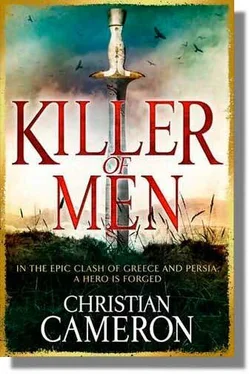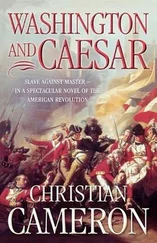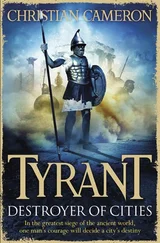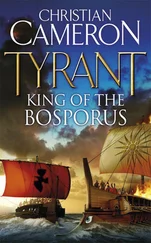Christian Cameron - Killer of Men
Здесь есть возможность читать онлайн «Christian Cameron - Killer of Men» весь текст электронной книги совершенно бесплатно (целиком полную версию без сокращений). В некоторых случаях можно слушать аудио, скачать через торрент в формате fb2 и присутствует краткое содержание. Жанр: Исторические приключения, на английском языке. Описание произведения, (предисловие) а так же отзывы посетителей доступны на портале библиотеки ЛибКат.
- Название:Killer of Men
- Автор:
- Жанр:
- Год:неизвестен
- ISBN:нет данных
- Рейтинг книги:4 / 5. Голосов: 1
-
Избранное:Добавить в избранное
- Отзывы:
-
Ваша оценка:
- 80
- 1
- 2
- 3
- 4
- 5
Killer of Men: краткое содержание, описание и аннотация
Предлагаем к чтению аннотацию, описание, краткое содержание или предисловие (зависит от того, что написал сам автор книги «Killer of Men»). Если вы не нашли необходимую информацию о книге — напишите в комментариях, мы постараемся отыскать её.
Killer of Men — читать онлайн бесплатно полную книгу (весь текст) целиком
Ниже представлен текст книги, разбитый по страницам. Система сохранения места последней прочитанной страницы, позволяет с удобством читать онлайн бесплатно книгу «Killer of Men», без необходимости каждый раз заново искать на чём Вы остановились. Поставьте закладку, и сможете в любой момент перейти на страницу, на которой закончили чтение.
Интервал:
Закладка:
They talked more, but that's how I remember it – the day the idea was born. In fact, it was just grumbling. We all hated Thebes, but they weren't hurting us any.
Epictetus stayed to dinner, though. And he offered to carry the cream of Pater's work over the mountains to Athens – and back, if it didn't sell. And Pater agreed. Then Epictetus commissioned a cup. He'd clearly seen the priest's cup and wanted one for himself.
'A cup I can drink from, in the fields or at home,' he said.
'What do you want on it?' Pater asked.
'A man ploughing a field,' Epictetus said. 'None of your gods and satyrs. A good pair of oxen and a good man.'
'Twenty Athenian drachmas,' Pater said. 'Or for nothing, if you carry my goods to Athens.'
Epictetus shook his head. 'Twenty drachmas is what you're worth,' he said. 'And I'll carry your goods anyway. If I take it as a gift, I owe you. If I pay you, you owe me.' That's the kind of man he was.
Pater worked like a slave for the rest of the summer, making finer things than were his wont. He made ten platters, the kind gentlemen served feasts on, and he made more cups, including the fanciest of the lot, with a ploughman, for Epictetus. And he made a Corinthian helmet – simple in design but perfect in execution. Even in the summer of my seventh year, I knew perfection in metal when I saw it.
Pater had no patience in him to teach the young, but he let me put it on my head. He laughed. 'You'll be a big man, Arimnestos,' he said. 'But not yet.'
He made bronze knives for me and for my brother, fine ones with some work on the backbone of the blade and horn scales on either side of the grip.
I worked like a slave that summer, because we were poor and we had just Bion's family as slaves – and Bion was far too skilled to waste his time putting air on the fire or punching holes in leather, or any of the other donkey work. And though my brother was too small to plough, he ploughed anyway, with help from Bion's son Hermogenes. Together they made a man.
Occasionally men like Myron would appear out of the air and take a turn at the plough, or repair a wheel, or perhaps sow a field. We had good neighbours.
When I wasn't in the forge, I was in the fields too. I loved that farm. Our land was at the top of a hill – a low hill, but it gave a view from the house. In the paved yard, where men stood to talk, you could see mighty Cithaeron rising like a slope-shouldered god, and you could see the walls of our city just across a little valley. Up on Cithaeron, we could see the hero's tomb and the sacred spring, and if we looked towards Plataea, we could see the Temple of Hera clear as a lamp in a dark room. The trees of Hera's grove were like spears pointing up the hill at our little acropolis, even though they were stades away. We had an apple tree at the top of the olive grove, and I went up and trimmed the new growth in the spring and again in the autumn. We had grapes on the hillside, and when we had no other work to do, Hermogenes and Chalkidis and I would build trellises to carry the vines.
There was a small wood by the stream at the base of the hill, and the old people had dug a fish pond. I could pretend that we were great lords, with our own hill fort and our own woods for hunting, although we didn't have an animal larger than a rabbit to hunt. But there's no memory dearer to me than walking home from the agora in Plataea with Bion – we must have just sold some wine, or perhaps some oil, and I was allowed to go to town – walking home past the turning where our road went down to the stream and then up the hill to our house, and thinking, this is my land. My father is king here.
Most nights, unless Mater was raving drunk, we'd meet in the courtyard after dinner and watch the sun set. We had a swing in the courtyard olive tree. Pater showed me the grooves in the branch that bore it, sunk into the wood the way chariot wheels will cut ruts even in stone. The swing had been on that tree for many lives of men.
It may sound dull to you, dear, but to watch a sunset from a swing on your own land is a very good thing.
It must have been after the festival of Demeter – because all the harvest was in – that Epictetus arrived with his wagons. He had two. No one else we knew had two wagons.
'Well?' he said, when his wagons were in the yard.
Pater and Bion had all the bronze laid out, so that our courtyard looked as if it had been touched by King Midas.
Epictetus walked around, handled everything and finally nodded sharply. He picked up his cup – snatched it up – and then looked at Pater for confirmation that it was, indeed, his.
'Don't get many requests for a plough and oxen,' Pater said.
Epictetus looked at it, then hefted it in his hand.
Bion stepped forward and poured wine into it. 'You have to feel it full,' he said with a smile.
Epictetus poured a libation and drank. 'Good cup,' he said. 'Pay the man, boy,' he said to his son.
'I'd rather have it in bronze, from Athens,' Pater said.
'Less a quarter for cartage?' Epictetus asked.
'Less an eighth for cartage,' Pater said.
Epictetus nodded, and they both spat on their hands and shook, and the thing was done. Then the hired men loaded all the work of a summer and the big wagons rolled away down the hill.
I was old enough to know that all of Pater's stock of bronze was rolling away in those carts. He had nothing left but scraps to make repairs. If robbers took Epictetus on the roads, we were finished. I knew it.
And I felt it over the next weeks. Pater was a fair man, but when he was dark, he hit us, and those weeks were dark. One afternoon he even hit Bion – savagely. And I dropped a fine bowl and he beat me with a stick. He beat my brother when he caught him watching the girls bathe, and he raged at us every day.
Mater was sober. It has an odd sound to it, but it was as if she knew she was needed. So she stopped drinking and did housework. She read aloud to us every day from a stool by her loom, and she was very much like the aristocratic lady she'd been born to be.
I loved her stories. She would tell us the myths of the gods, or sing pieces of the Iliad or other stories, and I would devour them the way my brother devoured meat. But when she was done, and the magic of her voice faded, she was just my dull and drunken mother, and I couldn't like her. So I went back to the fields.
It was in those weeks that I went into Plataea with Bion and pledged the family's credit to an iron knife. Only the gods know what I was thinking – a little boy with an iron knife? Who had a perfectly good bronze one on a thong round his neck? Children are as inscrutable as the gods.
Pater beat me so badly that I thought I might die. I see it now – I had pledged money he didn't have. And we were at the bottom. All our harvest and all our work was off at Athens, or lost on the road. I see it now, but at the time, it hurt me far more than just a beating. I decided that night, tears burning down my face, that he wasn't really my father. No man could treat his son that way.
That was a deeper pain than any blow. I still bear it.
The next day he apologized. In fact, he all but crawled to me, making false jokes and wincing when he touched my bruises, alternating with making light of my injuries. It was a strange performance, and in some way it was as confusing as the heavy beating.
And then he recovered. Whatever daimon was eating his soul, he rose above it. It was three weeks or more after Epictetus had left, and he was a week overdue. Pater came out into the vineyard with us and started building trellises – work he never did – as if it was the most natural thing in the world. He didn't complain, and he didn't hit anyone, and we worked steadily all day under the high, blue skies of autumn. The grapes were almost ripe and the trellises creaked. Bion and I were both physically wary of him – we had bruises to prove that we had the right – but he passed no reproof harder than a look. My brother fell on a vine and wrecked an hour's work, but Pater merely shook his head and took up his light bronze axe. He went off to the wood to cut more supports, and sent my brother to the river to cut reeds.
Читать дальшеИнтервал:
Закладка:
Похожие книги на «Killer of Men»
Представляем Вашему вниманию похожие книги на «Killer of Men» списком для выбора. Мы отобрали схожую по названию и смыслу литературу в надежде предоставить читателям больше вариантов отыскать новые, интересные, ещё непрочитанные произведения.
Обсуждение, отзывы о книге «Killer of Men» и просто собственные мнения читателей. Оставьте ваши комментарии, напишите, что Вы думаете о произведении, его смысле или главных героях. Укажите что конкретно понравилось, а что нет, и почему Вы так считаете.












